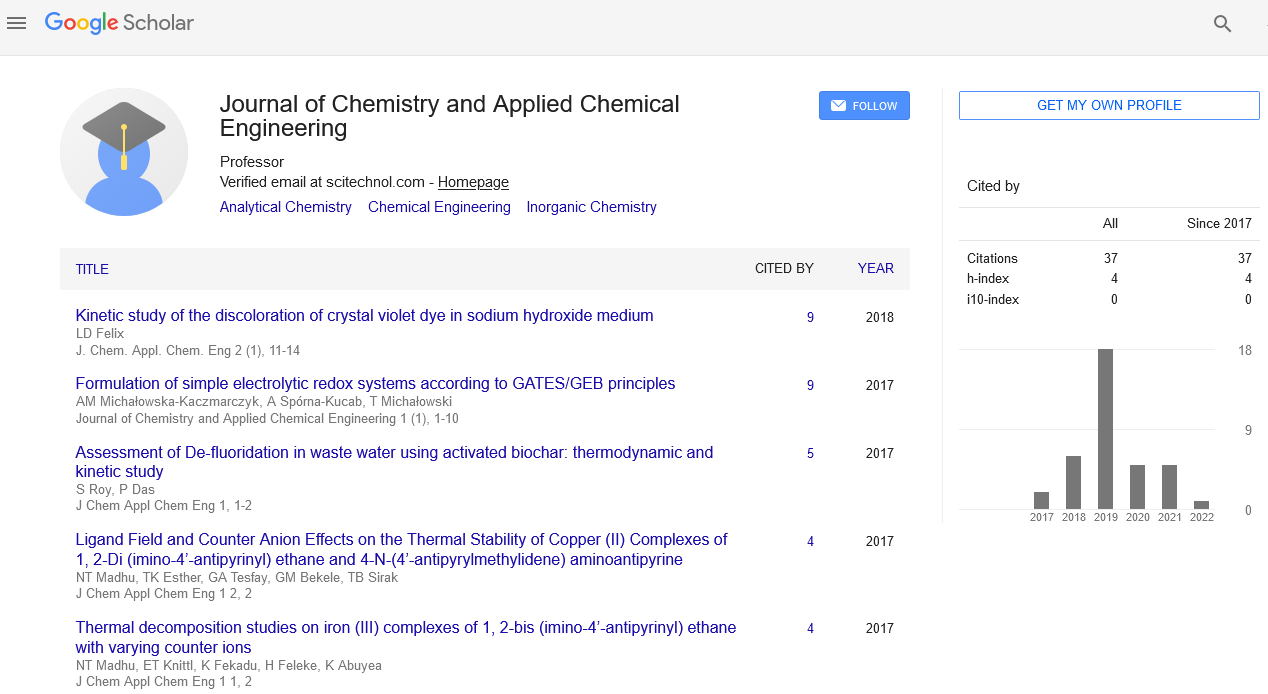Opinion Article, J Chem Appl Chem Eng Vol: 7 Issue: 2
The Chemical Interactions through Culturing Techniques
David Vracko*
1Department of Chemistry, University of Toronto, Toronto, Canada
*Corresponding Author: David Vracko,
Department of Chemistry, University of
Toronto, Toronto, Canada
E-mail: vrackodavid@gmail.com
Received date: 23 May, 2023, Manuscript No. JCACE-23-106809;
Editor assigned date: 25 May, 2023, Pre QC No. JCACE-23-106809 (PQ);
Reviewed date: 08 June, 2023, QC No. JCACE-23-106809;
Revised date: 15 June, 2023, Manuscript No. JCACE-23-106809 (R);
Published date: 22 June, 2023, DOI: 10.4172/Jcace.1000025
Citation: Vracko D (2023) The Chemical Interactions through Culturing Techniques. J Chem Appl Chem Eng 7:2.
Description
Cell culturing refers to the technique of growing and maintaining cells in a controlled environment for research or experimental purposes related to chemical studies. This specialized application of cell culturing is particularly relevant in fields such as chemical biology, biochemistry, and drug discovery, where the interaction of chemicals with living cells is of paramount importance. Cell culturing in chemistry plays a vital role in understanding cellular responses to chemical compounds, studying drug mechanisms, and elucidating molecular pathways.
Chemical biology and drug discovery
Chemical biology is an interdisciplinary field that uses chemical tools and techniques to study biological processes. Cell culturing is an essential component of chemical biology research, as it allows scientists to study the effects of various chemical compounds on cells. By exposing cells to different chemicals, researchers can identify potential drug candidates, understand their mechanisms of action, and investigate their impact on cellular pathways and signaling cascades.
HTS assays involve the rapid screening of a large number of chemical compounds against a target of interest. Cell culturing is essential in HTS assays as it enables researchers to assess the effects of thousands of chemicals on cell viability, proliferation, or specific cellular processes in a short period. HTS assays are widely used in drug discovery and the identification of bioactive compounds.
Toxicology studies
Cell culturing in chemistry is extensively used in toxicology studies to evaluate the toxicity of various chemicals, environmental pollutants, or potential drugs. By exposing cultured cells to different concentrations of a chemical, researchers can determine its toxic effects, understand the underlying mechanisms, and assess its safety profile. In chemical studies, researchers often investigate how cells metabolize or transform specific compounds. Cell culturing allows scientists to monitor the metabolic pathways and enzymatic activities involved in chemical transformations within the cells. This information is essential in drug metabolism studies and understanding the fate of chemicals in living organisms.
Chemical compounds often interact with specific receptors on the cell surface or within the cell, triggering various signaling pathways. Cell culturing facilitates the study of these interactions, providing insights into receptor-ligand binding, downstream signaling events, and cellular responses induced by chemical stimuli. Cell culturing enables researchers to examine cellular responses to specific chemical stimuli, such as changes in gene expression, protein synthesis, or intracellular calcium levels. These responses can shed light on how cells adapt and react to different chemical environments.
Pharmacokinetics and drug delivery
In drug development, understanding the pharmacokinetics of a compound is essential to determine its absorption, distribution, metabolism, and excretion within the body. Cell culturing allows researchers to study drug uptake and efflux, cellular distribution, and drug transport mechanisms, providing valuable information for optimizing drug delivery strategies.
In personalized medicine, cell culturing is used to produce patientderived cell lines or organoids to study individual responses to specific drugs. This approach is particularly relevant in precision oncology, where cultured cancer cells from a patient can be exposed to different chemotherapeutic agents to identify the most effective treatment for that individual. Cell culturing in chemistry is a powerful tool that enables researchers to explore the complex interactions between chemical compounds and living cells. It has diverse applications in chemical biology, drug discovery, toxicology, and personalized medicine, contributing to the advancement of scientific knowledge and the development of new therapeutic approaches. By understanding the cellular responses to various chemicals, researchers can design safer and more effective drugs and gain deeper insights into the molecular mechanisms underlying cellular behavior.
 Spanish
Spanish  Chinese
Chinese  Russian
Russian  German
German  French
French  Japanese
Japanese  Portuguese
Portuguese  Hindi
Hindi 